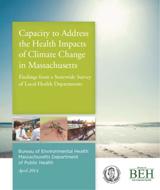Massachusetts Surveys Climate Readiness of Public Health Departments
 Massachusetts Public Health Survey Report Cover.Climate change threatens human health through a variety of pathways including more frequent extreme weather events, decreased air quality, and increased spread of vector-borne diseases. Massachusetts, recognizing this risk, surveyed its local boards of public health to gauge the state’s level of public health preparedness for climate change. The Massachusetts Department of Health was interested in the local boards’ current understanding, level of preparedness, and response capabilities for projected climate change risks. The survey covered surveillance, planning, and intervention activities associated with heat stress, hazardous weather events, indoor air quality, food supply/agricultural issues, vector-borne diseases, and water quality issues. The survey helped identify communities that may be more vulnerable to projected climate change risks. State and local communities can use this knowledge to increase resiliency and adaptive capacity by more effectively guiding and targeting resources and actions to vulnerable health departments.
Massachusetts Public Health Survey Report Cover.Climate change threatens human health through a variety of pathways including more frequent extreme weather events, decreased air quality, and increased spread of vector-borne diseases. Massachusetts, recognizing this risk, surveyed its local boards of public health to gauge the state’s level of public health preparedness for climate change. The Massachusetts Department of Health was interested in the local boards’ current understanding, level of preparedness, and response capabilities for projected climate change risks. The survey covered surveillance, planning, and intervention activities associated with heat stress, hazardous weather events, indoor air quality, food supply/agricultural issues, vector-borne diseases, and water quality issues. The survey helped identify communities that may be more vulnerable to projected climate change risks. State and local communities can use this knowledge to increase resiliency and adaptive capacity by more effectively guiding and targeting resources and actions to vulnerable health departments.
| How Did They Do It? | Applicable EPA Tools |
|---|---|
Assessed the state public health system’s current perceived capacity to deal with projected climate risks
|
CDC's Health Vulnerability: Climate Change Guide For Health Departments helps communities assess capacity and vulnerability to climate risks. Health Vulnerability: Climate Change Guide For Health Departments * (This is a non-EPA resource from the Centers for Disease Control and Prevention.) |
Identified knowledge gaps on vulnerable populations
|
EPA's EJ Screen combines environmental and demographic indicators to help highlight places that may be vulnerable to human health impacts on climate change (example demographic indicators include elderly, extremely young, low-income, linguistically isolated communities) and may warrant further review as environmental justice communities. |
Prepared a final report with recommended steps to increase public health system’s adaptive capacity
|
EPA's Climate Impacts on Health Page provides information to better increase knowledge of the expected human health risks from climate change. |
Similar Cases and More Information
Massachusetts acknowledged that while the survey has helped identify prospective vulnerabilities, they are unable to tie this data to projected vulnerabilities without further research. To see an example of how a community has identified projected public health vulnerabilities, see the Minnesota Climate Health case study. To see an example of specific steps to reduce vulnerabilities and adapt to changing conditions, view Chicago’s Adaptation to Extreme Heat Events, or for how to increase adaptive capacity of vulnerable populations, view Chicago’s Heat Emergency Response.
- Minnesota Climate Health case study
- Chicago’s Adaptation to Extreme Heat Events
- Chicago’s Heat Emergency Response
References
- Capacity to Address the Health Impacts of Climate Change in Massachusetts Findings from a Statewide Survey of Local Health Departments (PDF) (56 pp, 3.5 MB, About PDF) Exit
- Massachusetts Environmental Public Health Tracking Exit
- Massachusetts Executive Office of Health and Human Services: Climate Change Exit

